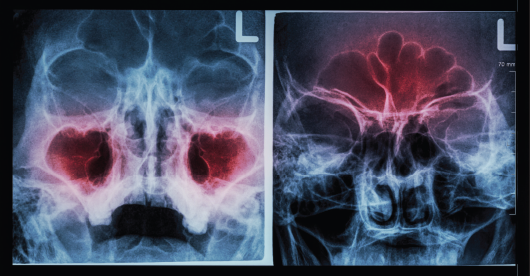
© Puwadol Jaturawutthichai / shutterstock.com
Dr. Hwang explained that nasal steroids are most effective when they are prescribed with customized dosing regimens that deliver higher doses topically, such as steroid eye drops delivered directly transnasally or diluted in normal saline. While these protocols may be the most helpful, he acknowledged that they are not without risk. For example, a 2016 report of 48 patients treated with budesonide for a mean of 22 months found that approximately one quarter of the patients had abnormally low stimulated cortisol levels (Int Forum Allergy Rhinol. 2016;6:568–572). The risk of abnormal cortisol levels was associated with concomitant use of pulmonary inhaled steroids. Thus, while long-term use of budesonide nasal irrigations is generally safe, asymptomatic suppression of the hypothalamic-pituitary-adrenal (HPA) axis may occur in selected patients. In particular, the investigators identified concomitant use of both nasal steroid sprays and pulmonary steroid inhalers while using daily budesonide nasal irrigations as the cause of the increased risk. The authors cautioned that rhinologists should be aware of the potential risks of long-term use of budesonide nasal irrigations and should monitor patients receiving this therapy for HPA axis suppression.
Explore This Issue
November 2017Otolaryngologists may also prescribe antibiotics in an effort to have a positive effect on the sinus microbiome. In some cases, the antibiotics are prescribed without any specific knowledge of the microbiome. In other cases, the physician cultures the microbes from the sinuses and prescribes culture-directed therapy. Unfortunately, it is not obvious that this culture-directed therapy provides an additional benefit to the patient.
While the scientific literature supports antibiotic therapy in general, the data are complicated. One study in support of culture-directed topical antibiotics evaluated 58 patients with recalcitrant CRS post-ESS (Am J Rhinol Allergy. 2016;30:414–417). The patients were treated with culture-directed topical antibiotics and trended toward improvement in symptom severity. They also displayed improved appearance by endoscopy. Additionally, 72% of them had negative posttreatment culture results indicative of microbiological “control.” The results are consistent with the use of high-volume culture-directed topical antibiotics.
Dr. Pullen is a freelance medical writer based in Illinois.
Disclosures: Dr. McCoul is a consultant for Acclurent. Dr. Tabaee is a scientific advisor to Spirox. Dr. Hwang is a consultant with Medtronic.
Take-Home Points
- ESS can fail for many reasons, including patient/disease factors, anatomy, incomplete surgery, ostial stenosis, recirculation, neo-osteogenesis, and recurrent mucosal disease.
- Nasal steroids can be effective treatment for CRS, but they also are associated with risks.
- Culture-directed topical antibiotics may be helpful, although data are conflicting.